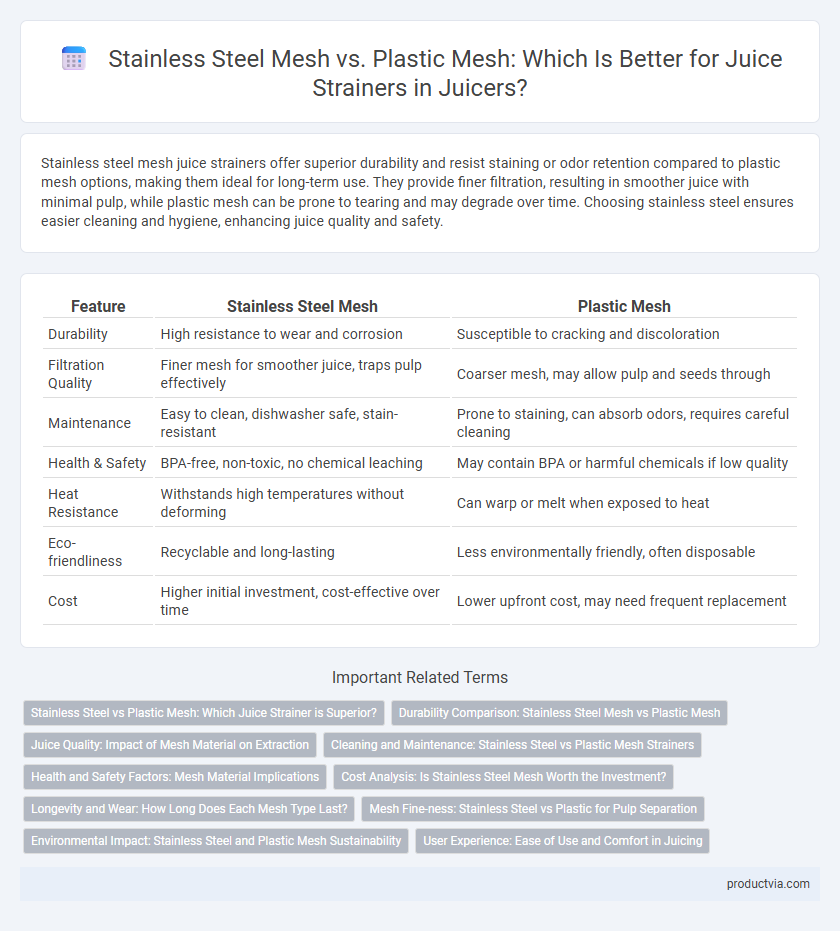Stainless steel mesh juice strainers offer superior durability and resist staining or odor retention compared to plastic mesh options, making them ideal for long-term use. They provide finer filtration, resulting in smoother juice with minimal pulp, while plastic mesh can be prone to tearing and may degrade over time. Choosing stainless steel ensures easier cleaning and hygiene, enhancing juice quality and safety.
Table of Comparison
| Feature | Stainless Steel Mesh | Plastic Mesh |
|---|---|---|
| Durability | High resistance to wear and corrosion | Susceptible to cracking and discoloration |
| Filtration Quality | Finer mesh for smoother juice, traps pulp effectively | Coarser mesh, may allow pulp and seeds through |
| Maintenance | Easy to clean, dishwasher safe, stain-resistant | Prone to staining, can absorb odors, requires careful cleaning |
| Health & Safety | BPA-free, non-toxic, no chemical leaching | May contain BPA or harmful chemicals if low quality |
| Heat Resistance | Withstands high temperatures without deforming | Can warp or melt when exposed to heat |
| Eco-friendliness | Recyclable and long-lasting | Less environmentally friendly, often disposable |
| Cost | Higher initial investment, cost-effective over time | Lower upfront cost, may need frequent replacement |
Stainless Steel vs Plastic Mesh: Which Juice Strainer is Superior?
Stainless steel mesh offers superior durability, corrosion resistance, and fine filtration compared to plastic mesh, making it ideal for efficient juice extraction and longevity. Unlike plastic, stainless steel does not retain odors or degrade over time, ensuring safe and hygienic use. This makes stainless steel mesh the preferred choice for high-quality juice strainers in both home and commercial settings.
Durability Comparison: Stainless Steel Mesh vs Plastic Mesh
Stainless steel mesh offers superior durability compared to plastic mesh, resisting corrosion, staining, and physical wear over time. Its robust construction ensures long-lasting performance in juicing, maintaining sharp filtration without warping or cracking. Plastic mesh, while lightweight and cost-effective, tends to degrade with frequent use, becoming brittle and prone to tears, reducing its overall lifespan in juice strainers.
Juice Quality: Impact of Mesh Material on Extraction
Stainless steel mesh in juice strainers offers superior durability and finer filtration, resulting in clearer juice with minimal pulp and sediment compared to plastic mesh. Plastic mesh tends to degrade over time and may impart unwanted flavors or allow more pulp through, affecting overall juice quality. Choosing stainless steel mesh enhances extraction efficiency and preserves the natural taste and nutritional value of fresh juice.
Cleaning and Maintenance: Stainless Steel vs Plastic Mesh Strainers
Stainless steel mesh strainers offer superior durability and resistance to staining, making them easier to clean and less prone to retaining odors compared to plastic mesh. Plastic mesh strainers can harbor pulp and residue in microscopic grooves, which complicates thorough cleaning and increases the risk of mold buildup. Regular maintenance of stainless steel strainers involves simple rinsing or dishwasher use, while plastic requires more meticulous scrubbing to prevent clogging and deterioration over time.
Health and Safety Factors: Mesh Material Implications
Stainless steel mesh in juice strainers offers superior health benefits due to its non-porous surface, resisting bacterial growth and ensuring durability under frequent cleaning and high temperatures. Plastic mesh may retain odors and harbor bacteria within microscopic cracks, raising safety concerns over long-term use and potential chemical leaching. Choosing stainless steel mesh ensures safer juice extraction by minimizing contamination risks and providing a more hygienic straining option.
Cost Analysis: Is Stainless Steel Mesh Worth the Investment?
Stainless steel mesh juice strainers generally have a higher upfront cost compared to plastic mesh, but offer superior durability and longevity, reducing long-term replacement expenses. Plastic mesh may be cheaper initially, but it wears out faster, leading to frequent purchases that increase overall cost. Investing in stainless steel mesh proves cost-effective over time due to its resistance to corrosion, easy maintenance, and consistent performance in juice extraction.
Longevity and Wear: How Long Does Each Mesh Type Last?
Stainless steel mesh juice strainers typically last significantly longer than plastic mesh due to their resistance to corrosion, high temperatures, and physical wear. Plastic mesh can degrade over time, becoming brittle and more prone to tearing or warping, especially with frequent exposure to acidic fruit juices and repeated cleaning cycles. Choosing stainless steel ensures durability and consistent performance, often extending the lifespan of a juice strainer by several years compared to plastic alternatives.
Mesh Fine-ness: Stainless Steel vs Plastic for Pulp Separation
Stainless steel mesh offers superior fine-ness in pulp separation for juice strainers, providing a tighter weave that effectively filters out smaller pulp particles compared to plastic mesh. This fine mesh enhances juice clarity while maintaining durability and resistance to staining or odor retention. Plastic mesh, while more flexible and lightweight, generally has larger holes that allow more pulp through, resulting in less refined juice consistency.
Environmental Impact: Stainless Steel and Plastic Mesh Sustainability
Stainless steel mesh juice strainers offer superior environmental sustainability due to their durability and recyclability, reducing waste and the need for frequent replacements. Plastic mesh strainers contribute to plastic pollution and often end up in landfills or oceans, posing long-term ecological risks. Choosing stainless steel aligns with eco-friendly practices by minimizing environmental impact and supporting a circular economy.
User Experience: Ease of Use and Comfort in Juicing
Stainless steel mesh offers superior durability and finer filtration, ensuring smoother juice with minimal pulp, enhancing user comfort by reducing effort during straining. Plastic mesh is lighter and often easier to handle, but it may clog more quickly and wear down faster, requiring frequent cleaning and replacement which can reduce convenience. Users seeking long-term, hassle-free juicing prefer stainless steel mesh for its robust performance and comfortable grip during extended use.
Stainless steel mesh vs Plastic mesh for juice strainer Infographic

 productvia.com
productvia.com